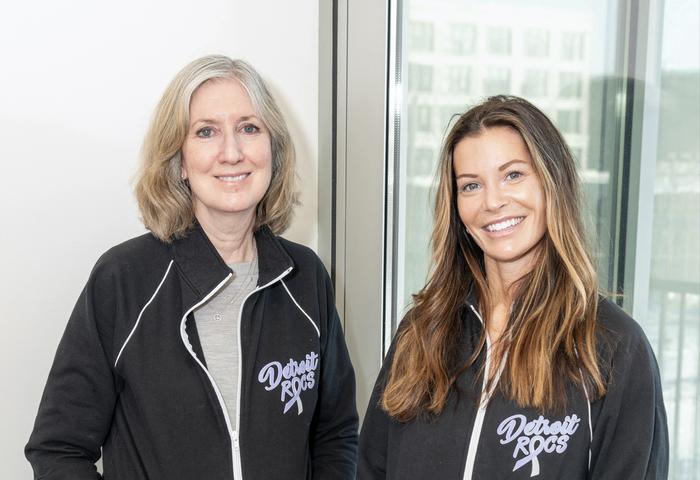DETROIT – A team of researchers from Wayne State University and the Barbara Ann Karmanos Cancer Institute has received a five-year, $9.6 million grant from the National Cancer Institute of the National Institutes of Health for the study “Genetic Variation in Cancer Risk and Outcomes in African Americans.” This is a Program Project Grant that includes three large studies. The team will work to improve the identification and clinical management of hereditary and multiple primary cancers in African Americans, a population that is currently underrepresented in genetic research.

Credit: Jasmine Brown, Barbara Ann Karmanos Cancer Institute
DETROIT – A team of researchers from Wayne State University and the Barbara Ann Karmanos Cancer Institute has received a five-year, $9.6 million grant from the National Cancer Institute of the National Institutes of Health for the study “Genetic Variation in Cancer Risk and Outcomes in African Americans.” This is a Program Project Grant that includes three large studies. The team will work to improve the identification and clinical management of hereditary and multiple primary cancers in African Americans, a population that is currently underrepresented in genetic research.
According to Ann Schwartz, Ph.D., principal investigator of the project, professor and associate chair of oncology at the Wayne State University School of Medicine, and vice president and deputy director of research and academic affairs at the Barbara Ann Karmanos Cancer Institute, genetic testing has identified high-risk populations for targeted prevention and screening, identified targets for new treatment strategies, and has led to some of the most significant inroads in reducing cancer burden. Jennifer Beebe-Dimmer, Ph.D., is the co-principal investigator on this award and is a professor of oncology at Wayne State University School of Medicine and leader of the Population Studies and Disparities Research Program at Karmanos Cancer Institute.
“We have assembled one of the largest populations of African American cancer survivors to date in a study called Detroit Research on Cancer Survivors – or ROCS – to now study genetic susceptibility and genetic testing in this population,” said Schwartz. “Our overall goal for this new project is to improve the identification and clinical management of hereditary and multiple primary cancers in African Americans.”
While genetic testing to date has made a great impact on identifying high-risk populations for targeted prevention, screening and treatment strategies, there is still much to learn about the role of inherited genetic susceptibility and cancer, especially in underrepresented populations. To date, most genetic studies have been conducted in largely non-Hispanic white populations with uncertain applicability to minority populations, limiting strides in early diagnosis and treatment that can result in increasing disparities in cancer incidence and mortality.
“While a number of penetrant cancer-susceptibility genes have been identified in African Americans, there is still a need to expand clinical testing in minority populations,” said Schwartz. Kristen Purrington, Ph.D., MPH, WSU and Karmanos, and Elena Stoffel, M.D., MPH, University of Michigan, are leading a project to better understand contributions from variants of uncertain clinical significance that occur in the high-risk African American population.
Beebe-Dimmer and Kathleen Cooney, M.D., Duke University, are leading a project to identify risk factors for multiple primary cancers.
According to Beebe-Dimmer, “If we can identify potentially modifiable risk factors that can partially mitigate genetic risk related to highly penetrant variants and understand their relationship to more common variants of low-penetrance, we may provide a pathway to improve cancer screening and prevention.”
While the current genetic knowledge has improved over time, there are still significant barriers to accessing genetic counseling and testing services among African Americans. The third project, led by Felicity Harper, Ph.D., and Hayley Thompson, Ph.D., both at Wayne State University and Karmanos, will lead to novel strategies to improve genetic testing in this population.
“This work has the potential to be game-changing for the African American community – who is often left out of cutting-edge cancer research,” said Ezemenari M. Obasi, Ph.D., vice president for research at Wayne State University. “By developing novel strategies to overcome barriers to testing, Drs. Schwartz and Beebe-Dimmer and their team will make great strides in reducing cancer burden and health disparities.”
The grant number for this National Cancer Institute of the National Institutes of Health grant is NCI P01CA272239.
###
About Wayne State University
Wayne State University is one of the nation’s pre-eminent public research universities in an urban setting. Through its multidisciplinary approach to research and education, and its ongoing collaboration with government, industry and other institutions, the university seeks to enhance economic growth and improve the quality of life in the city of Detroit, state of Michigan and throughout the world. For more information about research at Wayne State University, visit research.wayne.edu.
About the Barbara Ann Karmanos Cancer Institute
Karmanos Cancer Institute is a leader in transformative cancer care, research and education through courage, commitment and compassion. The Karmanos vision is a world free of cancer. As part of McLaren Health Care, Karmanos is the largest provider of cancer care and research in Michigan. For more than 75 years, the administrative and research headquarters, along with the premier specialty cancer hospital, have been located in downtown Detroit. With 16 network sites, Karmanos delivers world-renowned care and access to clinical trials throughout Michigan and northern Ohio. The National Cancer Institute recognizes Karmanos as one of the best cancer centers in the nation with a comprehensive cancer center designation. Its academic partnership with the Wayne State University School of Medicine provides the framework for cancer research and education – defining new standards of care and improving survivorship. For more information, call 1-800-KARMANOS (800-527-6266) or visit www.karmanos.org. Follow Karmanos on Facebook, Twitter, LinkedIn and YouTube.



